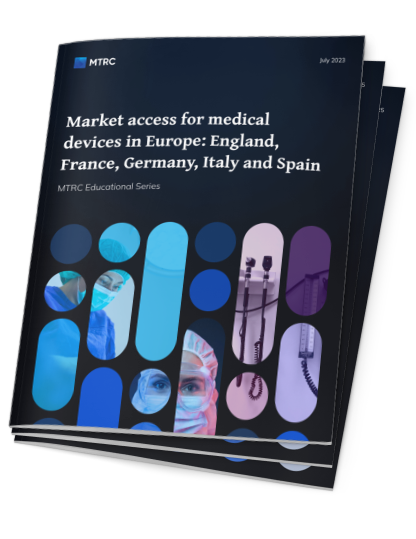
Key Topics
There are three key themes describing market access for medical technologies in England:
- Reimbursement: payment mechanism via HRG system, add-on reimbursement via High Cost Device List
- Funding: approval by the national (NHS England) or regional (Integrated Care Boards) payers
- Health technology assessment: obtaining recommendations from the National Institute for Health and Care Excellence (NICE)
England has a number of innovative payment schemes for medical technologies (including Med Tech Funding Mandate).

Reimbursement
The payment mechanisms for hospital, day case, and ambulatory specialist care are defined in the NHS Payment Scheme, which is approved by NHS England for two years (the financial year starts in April).
The key payment mechanism (“aligned payment and incentive scheme”) includes fixed (global budget) and variable (activity/quality-based) components. The global budget (fixed component) is the key budget allocation mechanism for non-elective (urgent) healthcare services. The fixed budget is based on historical budgets provided and the agreed volume of activity (HRG can serve as a reference).
The role of the HRG system is limited to all elective (non-urgent) procedures. HRGs are determined by a combination of a procedure (OPCS; released every three years) and diagnosis (ICD-10) codes.
Add-on reimbursement via High Cost Device List exists for certain medical devices, procedures, and a number of in-vitro diagnostic tests (mostly molecular oncology).

Funding
It is essential for the industry to determine the responsible commissioner, as it impacts the market access pathway and its complexity in England. Most innovative, complex procedures will fall under the category of specialized services and require approval by NHS England.
Local commissioners typically maintain lists of not routinely commissioned or restricted services.
Health Technology Assessment
Health technology assessment by NICE is very influential. NICE has several programs focused on medical devices. The most important programs are listed below.
Interventional Procedures Program
- The Interventional Procedures Program is developed for most of the novel interventional/invasive procedures entering the English market
- The program focuses solely on clinical evidence
- Recommendations may vary from "for research only" to "for use with standard arrangements for clinical governance, consent, and audit"
- Recommendations are not binding, although they are followed by providers and commissioners (especially by local commissioners)
Diagnostic Assessment Program
- A complex assessment program for diagnostic tests and technologies. The program focuses on both clinical and cost-effectiveness
- Recommendations are not binding, but they can be a substantial asset when promoting technology in England
Medical Technologies Evaluation Program
- The program focuses on the identification and assessment of cost-saving technologies
- It considers clinical effectiveness and cost analysis
- Evidence requirements are lower compared to other programs at NICE
- Recommendations are not binding, but they can be a substantial asset when promoting technology in England
Early Value Assessment Program
- The pilot program focuses on rapid assessment of digital technologies
- The focus is on technologies that address national unmet needs
- Evidence requirements are lower compared to other programs at NICE
- Recommendations are not binding
Late Stage Assessment Program
- The program assesses technologies in widespread use in the NHS
- The goal is to assess if the value added by incremental innovation justifies the price variation and informs commissioning and procurement decisions
- Recommendations are not binding

Specifics for IVD Tests
There is no specific reimbursement framework for in-vitro diagnostic tests. Most IVD tests are funded using a global budget principle as part of the funding of the labs.
Some expensive tests are subject to payment via the High Cost Device List.
Genomic tests are regulated via the National Genomic Test Directory.
Get Insights from MTRC Free Analytical Reports
Gain in-depth insights into market access challenges and evidence requirements for medical technologies in England with free MTRC analytical reports and white papers

Explore MTRC research papers:
- Market access for medical devices in Europe: England, France, Germany, Italy and Spain (Report #1)
- Market access for in-vitro diagnostic tests in Europe: England, France, Germany, Italy and Spain (Report #8)
- Evidence Requirements for IVD Tests in NICE HealthTech Evaluations (Report #31)
- Evidence Requirements for Non-IVD Diagnostics at NICE’s HealthTech Programme (Report #32)
- Reimbursement of Day Case Surgery Procedures in Europe (Report #33)
How can MTRC Help?
Development of reimbursement analysis (procedure coding, payment mechanism, reimbursement tariffs, policy and HTA considerations)
Development of market access strategy
Development of the submission dossier for the HTA process at NICE
Development of the health economic model in the UK settings
Access to an educational seminar on the UK reimbursement system
MTRC has experience with more than 381 projects in England
Get in Touch
Contact us to discuss your needs and learn about our services



